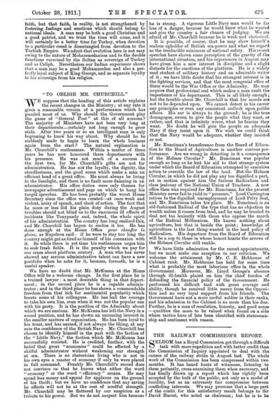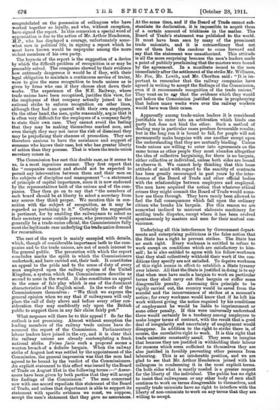THE RAILWAY COMMISSION'S REPORT.
SELDOM has a Royal Commission got through a difficult task with more expedition and with better credit than the Commission of Inquiry appointed to deal with the causes of the railway strike in August last. The whole work of the Commission has been compressed within two months. It has heard hosts of witnesses, listening to them patiently, cross-examining them when necessary, and has finally drawn up a report which has rightly been accepted by the bulk of the public, not only as a model of lucidity, but as an extremely fair compromise between conflicting interests. We may presume that a large part of the credit for this satisfactory result belongs to Sir David Harrel, who acted as chairman; but he is to be congratulated on the possession of colleagues who have worked together so loyally, and who, without exception, have signed the report. In this connexion a special word of appreciation is due to the action of Mr. Arthur Henderson, M.P., who has displayed a courage, unfortunately some- what rare in political life, in signing a report which he must have known would be unpopular among the more violent members of his own party.
The keynote of the report is the suggestion of a device by which the difficult problem of recognition is or may be peaceably solved. The companies showed by their evidence how extremely dangerous it would be if they, with their legal obligation to maintain a continuous service of trains, were to give the same recognition to trade unions as is given by firms who can if they choose shut down their works. The experience of the N.E. Railway, where trade unions have been recognized, justifies this view, for the employees of that company actually joined in the national strike to enforce recognition on other lines, although they had no quarrel with their own employers. On the other hand, the men, quite reasonably, argue that it is often very difficult for the employees of a company fairly to state their own case. They cannot avoid the feeling that they may be making themselves marked men, and even though they may not incur the risk of dismissal they may be prejudicing their chances of promotion. They are therefore anxious to have the assistance and support of someone who knows their case, but who has greater liberty of action than they possess. That is where the trade-union secretary comes in.
The Commission has met this double case, as it seems to us, in a most ingenious manner. They first report that the " companies cannot and should not be expected to permit any intervention between them and their men on the subjects of discipline and management "—a statement of principle of capital importance, since it is now endorsed by the representatives both of the unions and of the com- panies. They then go on to say that " the members of each board should be at liberty to select a secretary from any source they think proper. We mention this in con- nexion with the subject of recognition, as it may be regarded as pertaining to it." Certainly the suggestion is pertinent, for by enabling the railwaymen to select as their secretary some outside person, who presumably would generally be a trade-union official, the Commissioners fully meet the legitimate case underlying the trade-union demand for recoanitica.
The rest of the report is mainly occupied with details, which, though of considerable importance both to the com- panies and to the trade unions, are not of much interest to the general public. The peroration with which the report concludes marks the spirit in which the Commissioners undertook, and have carried out, their task. It constitutes an appeal to the pride and to the sense of duty of every man employed upon the railway system of the United Kingdom, a system which the Commissioners describe as second to none in the world. It also constitutes an appeal to the sense of fair play which is one of the dominant characteristics of the English mind. In the words of the Commissioners themselves : " We think we express the general opinion when we say that if railwaymen will only place the call of duty above and before every other con- sideration they may confidently rely upon the British public to support them in any fair claim fairly put."
What response will there be to this appeal ? So far the outlook is not promising. Almost without exception the leading members of the railway trade unions have de- nounced the report of the Commission. Parliamentary labour leaders have joined in the cry, and it is clear that the railway unions are already contemplating a fresh national strike. Prima facie such a proposal seems a wanton breach of a definite bargain. When the railway strike of August last was settled by the appointment of the Commission, the general impression was that the men had agreed to be bound by the verdict of the Commissioners. An explicit statement to this effect was issued by theBoard of Trade on August 21st in the following terms :—" Assur- ances have been given by both parties that they will accept the findings of the Commission." The men concerned now with one accord repudiate this statement of the Board of Trade, and unless that department is able to support its statement with specific evidence we must, we suppose, accept the men's statement that they gave no assurances. At the same time, and if the Board of Trade cannot sub- stantiate its declaration, it is impossible to acquit them of a certain amount of trickiness in the matter. The Board of Trade's statement was published to the world. It must have been seen by many of the prominent trade unionists, and it is extraordinary that not one of them had the candour to come forward and say that the statement was unauthorized. This attitude is all the more surprising because the men's leaders made a point of publicly proclaiming that the masters were bound by the agreement. In a manifesto issued to the men immediately after the settlement of the strike Mr. Williams, Mr. Fox, Mr. Lowth, and Mr. Charlton said : " It is im- portant to remember that the railway companies have agreed in writing to accept the findings of the Commission, even if it recommends recognition of the trade unions." They went on to say that the evidence which they would put before the Commission justified them in prophesying that before many weeks were over the railway workers would have won their cause.
Apparently among trade-union leaders it is considered justifiable to enter into an arbitration which binds one party but does not bind the other. Such a method of dealing may in particular cases produce favourable results; but in the long run it is bound to fail, for people will not permanently make bargains with one another except upon the understanding that they are mutually binding. Unless trade unions are willing to enter into agreements on the same terms as other people they must abandon altogether the idea of collective bargaining, for there is no bargain, either collective or individual, unless both sides are bound to observe it. We cannot help thinking that this loose attitude of mind with regard to the sanctity of contracts has been greatly encouraged in past years by the inter- ference of the Board of Trade and other official bodies with the relationships between employers and employed. The men have acquired the notion that whatever ethical crimes they might commit the Board of Trade would some- how see them through. They have rarely been allowed to feel the full consequences which fall upon the ordinary citizen who breaks his bargain. For this reason we are somewhat inclined to mistrust elaborate machinery for settling trade disputes, except where it has been evolved spontaneously by masters and men for their mutual con- venience.
Underlying all this interference by Government depart- ments and enterprising politicians is the false notion that the State has a right to prevent strikes. The State has no such right. Every workman is entitled to refuse to work except on conditions which are satisfactory to him- self ; he is also entitled to agree with his fellow-workmen that they shall collectively withhold their work if the con- ditions they specify are not satisfied. To deprive workmen of this right means in effect to establish a. State tyranny over labour. All that the State is justified in doing is to say that when men have made a bargain to work on particular terms they shall carry out that bargain or suffer some disagreeable penalty. Assuming this principle to be rigidly carried out, the country would be saved from the scandal and the inconvenience of strikes at a moment's notice; for every workman would know that if he left his work without giving the notice required by his conditions of employment he would be liable to imprisonment or some other penalty. If this were universally understood there would certainly be a tendency among employers to make longer terms of contract, with the result that a. good deal of irregularity and uncertainty of employment would disappear. In addition to the right to strike there is, of course, the correlative right to work. It is this right that trade unionists constantly assail. They seem to imagine that because they are justified in withholding their labour for reasons which seem sufficient to themselves they are also justified in forcibly preventing other persons from labouring. This is an intolerable position, and we are glad to see that Mr. Arthur Henderson joined with his colleagues in condemning it in the most explicit terms. On both sides what is mostly needed is a greater respect for the liberty of the individual. The public has no right to insist that railwaymen or any other body of men shall continue to work on terms disagreeable to themselves, and equally trade unionists have no right to interfere with the liberty of non-unionists to work on any terms that they are willing to accept.











































 Previous page
Previous page